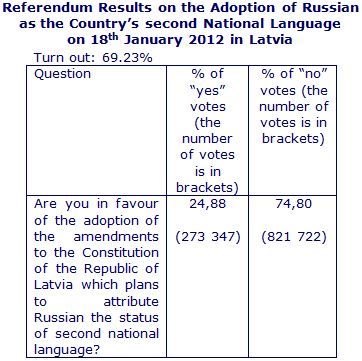Results
News
Corinne Deloy,
Fondation Robert Schuman,
Helen Levy
-

Available versions :
EN

Corinne Deloy
Fondation Robert Schuman
Helen Levy
A wide majority of Latvians (74.80%) voted against the adoption of Russian as their country's second official language. During a referendum on 18th February last one quarter of the electorate (24.88%) voted in support of the question – Do you support the adoption of the amendments to the Constitution of the Republic of Latvian that plan to provide Russian with the status of the country's second official language?
The "no" vote reached its highest level in the region of Kurzeme (west) where 91.53% rejected the modification of the Constitution. In Riga 63.82% made the same choice. The "yes" vote only came first in one of the country's five regions, in Latgale where 55.80% voted in support.
Half of those registered for the general elections i.e. 771,893 had to vote "yes" for the amendment to be adopted.
The popular consultation mobilised the Latvians: more than two thirds (69.23%) turned out to vote. Turnout was high in Riga (77%) and in the region of Vidzme (north), 72% and Kurzeme (70%). "It is a question of national identity which explains why most people did not consider this referendum as a simple political game and took part en masse," declared Ivars Ijabs, a political expert from the University of Latvia.
Around 350,000 people i.e. 17% of the population (figures provided by the Director of the Central Electoral Commission of Latvia, Arnis Cimdars), or "non-citizens" who do not have the right to vote in the national and local elections (nor to work in the police force and in the army) were not allowed to take part in the referendum. Mostly Russian speakers, these people do not have Latvian nationality, but since they are not citizens of another country either, they find themselves without a nationality at all. The status gives them the right to live in the country and have access to the social services. In all 27% of the Latvian population belong to the Russian minority.
Vladimir Linderman, one of the organisers of the referendum said that the Russian speakers of Latvia will continue to fight to assert their rights. "For the time being we do not have any real projects. We only know that the referendum is not the end. I think that the Russian speaking citizens will continue to fight for equal rights. Everything will take place within the law of course. Our main goal is to start dialogue and this has just started, of course with hysteria and panic, but it is better than the silence that has weighed over us for the last twenty years," he stressed, adding, "We, the Russians, are not just passing visitors, nor are we foreigners or occupiers. The Russians of Latvia must have the same rights and not be considered as second rate citizens." "We must start dialogue, which I hope will help people who speak different languages to understand and respect each other better, which in the end will make Latvian society more united and a stronger State," indicates Nils Usakovs, the mayor of Riga and leader of the Harmony Centre (SC) who supported the "yes" vote in the referendum.
In this consultation the supporters of the "yes" vote saw the opportunity to put an end to a form of discrimination whilst their opponents advised on the "no" arguing that a modification to the Constitution like this threatened Latvia's independence.
The President of the Latvian Republic, Andris Berzins, Prime Minister Valdis Dombrovskis, Unity (Vienotiba, V) and the leader of the Parliament Solvita Aboltina (V) voted against the attribution of the status of official national language to Russian. The latter qualified the referendum as provocation and the head of State declared that a victory of the "yes" vote would be a "vote against Latvia". As for the head of government, he stressed that the Latvian language was "one of the fundamentals of the State".
The words were more violent on the part of the National Alliance-All for Latvia, a member of the present government coalition. "It is a stab in the back. The referendum is not just about the language, it is a fight for power," declared its leader Raivis Dzintars.
The referendum followed the launch by the pro-Russian movement Dzimta valoda (native language) of a petition in support of the official status of the Russian language in Latvia. It was signed by 187, 378 people (including 90,000 in Riga) i.e. 12% of the total (a minimum of 154,379 signatures were necessary – representing 10% of the electorate, to launch the procedure). The signatures were validated on 19th December last by the Central Electoral Committee of Latvia. Three days later on 22nd December the Saeima, the only chamber in Parliament, rejected the draft law that aimed to make the Russian language official (60 of the 100 MPs voted against, none voted in support), which led to the organisation of a referendum. 30 MPs (including 15 from Unity, led by Prime Minister Valdis Dombrovskis, 14 from the National Alliance-All for Latvia and one from the Greens and Farmers' Union (ZZS) then –vainly – lodged a request with the Constitutional court to cancel the referendum (because they said it was unconstitutional).
 Source : Commission électorale centrale de Lettonie
Source : Commission électorale centrale de Lettonie
On the same theme
To go further
Elections in Europe
Corinne Deloy
—
20 January 2026
Elections in Europe
Corinne Deloy
—
13 January 2026
Elections in Europe
Corinne Deloy
—
4 November 2025
Elections in Europe
Corinne Deloy
—
28 October 2025

The Letter
Schuman
European news of the week
Unique in its genre, with its 200,000 subscribers and its editions in 6 languages (French, English, German, Spanish, Polish and Ukrainian), it has brought to you, for 15 years, a summary of European news, more needed now than ever
Versions :



